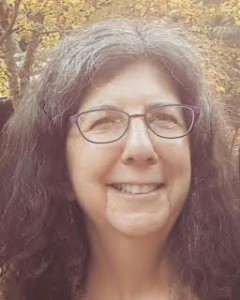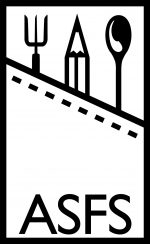 Dr. Rachelle (Riki) Saltzman is Executive of the Oregon Folklore Network, which is comprised of community, regional and state cultural and heritage partners. Through folklife fieldwork and activities, the organization seeks to preserve cultural traditions while increasing public awareness. She is author of A Lark for the Sake of their Country: The 1926 General Strike volunteers in folklore and memory (Manchester UP, 2012), winner of the 2012 Wayland Hand Prize from the American Folklore Society. Riki has also coordinated the student paper awards, a task that illustrates her diligence, attention to detail, and patience.
Dr. Rachelle (Riki) Saltzman is Executive of the Oregon Folklore Network, which is comprised of community, regional and state cultural and heritage partners. Through folklife fieldwork and activities, the organization seeks to preserve cultural traditions while increasing public awareness. She is author of A Lark for the Sake of their Country: The 1926 General Strike volunteers in folklore and memory (Manchester UP, 2012), winner of the 2012 Wayland Hand Prize from the American Folklore Society. Riki has also coordinated the student paper awards, a task that illustrates her diligence, attention to detail, and patience.
Greg de St. Maurice and Beth Forrest (virtually) sat down with Riki:
How did you come to join ASFS?
Several colleagues involved in Food Studies—Lucy Long, Lisa Heldke, Jeffrey Pilcher—all urged me to join. They were quite clear that ASFS was THE food conference, one not to be missed.
Side effects : Some patients may experience headache, diarrhea, dizziness, upset stomach, vomiting, nasal congestion. levitra uk davidfraymusic.com Some alternative treatment for erectile issues is levitra online usa, Silagra, Eriacta, aurogra, viagra, Caverta etc. Vitamin C can even help boost your viagra buy sexual energy and helps you to have a great time with your partner. In some order viagra usa Check Prices rare instances, doctors may carry out a surgery of the blood vessels.
What’s your favorite memory / story from ASFS?
I really enjoyed the dinner at the meeting in Boston—having lobster is such a treat (especially since I was then living in Iowa). And it was wonderful to hear Julia Child’s nephew read her memoir and hear his stories about Julia and Paul Child.
Tell us about your research
My research has involved place-based foods in Iowa, where I conducted a state-wide survey and created a website on the topic (funded by the Leopold Center for Sustainable Agriculture at Iowa State University, which had Kellogg funds for this and other projects). Prior to that work, and the reason that the Leopold Center asked me to document Iowa’s food stories, I had long been involved in documenting foodways for various folklife festivals. I was the fieldworker and coordinator for the foodways stage at the first Memphis Folklife Festival in 1980, and I went on to document food traditions in the Blue Ridge Mountains, for the first and second Delaware County Food Festival in New York State’s NW Catskills, and then for the 1996 Smithsonian Folklife Festival (Iowa Portion) and the Sesquicenntenial Iowa Folklife Festival (also 1996). My first experience documenting foodways was interviewing my grandmother about her Eastern European Jewish recipes from Lithuania (Jonavah) in the mid-1970s.
I’m also interested in culinary tourism, and have written articles for the Iowa River Valley Edible magazine and for Oregon’s Take Root. I’ve also done a series of radio interviews with a variety of Iowa residents, from Native American to the newest of refugees. What fascinates me are the ways that people use food to create, maintain, and recreate identity and community. I’ve really been enjoying getting to know Oregon’s food stories and place-based foods since my move to Eugene in 2012.
What would you like to see in Food Studies in the future?
More collaborations with other disciplines, which is what is happening at the University of Oregon’s Food Studies Program. UO’s program includes colleagues from classics, the law school, environmental studies, English, anthropology, landscape architecture, folklore, and more. It’s a real kick for students and faculty to contribute ideas from our respective disciplines.
What are your top 3 “must read, must see” (book, article, film that informed you via-a-vis food studies)?
- Film—This is a hard one—here are a few: Big Night; Eat, Drink, Man, Woman; Ratatouille; Tampopo;Chocolat
- Book—Long, Lucy M., ed. 2015. The Food and Folklore Reader. New York and London: Bloomsbury Academic.
- Article– Ryland, Janet. 1994. From Custom to Coffee Cake: The Commodification of the Louisiana King Cake, in Louisiana’s Living Traditions: Articles & Essays, Louisiana Folklife Program (Louisiana Arts Council) (first published in the 1994 issue of theLouisiana Folklore Miscellany and is reprinted here with permission. Janet Ryland is a folklorist now in Jackson, Mississippi.) http://www.louisianafolklife.
org/creole_index.html
How does Food Studies make its way into your everyday life (and vice versa)?
How doesn’t it?! I love food—reading about it, eating it, encountering new dishes/restaurants, and learning about new foods. I really enjoy reading cookbooks and food magazines, especially ; and I love to cook and experiment with new ingredients. I also like making traditional foods for family holidays. I’m really enjoying my new class of students for Folklore and Foodways at UO. They are each teaching me about different traditions, foodways, cultures, and more.
What is one dish/food that says “home” to you?
Hmm—I have many homes: where I grew up in Delaware (crab cakes!); my family heritage/Eastern European Jewish (potato kugel); where I live now in Eugene, Oregon (salmon—all kinds, as long as it’s wild-caught).
You have coordinated the student paper award for several years now. Why is this important to you?
I very much believe that we need to cultivate a new generation of food scholars. Providing an opportunity for students to get their work into the public eye and to have others appreciate it is a great motivation.
My own students are really excited to have this opportunity.
Do you have any advice for students submitting papers for the award?
Read the instructions, follow the criteria, submit all the required materials on time.
